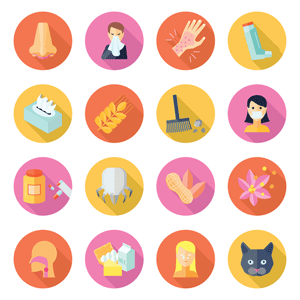
A. Respiratory allergies
Allergic rhinitis (nasal allergy, allergy of the nose or hay fever)
Breathing air that contains an allergen can cause allergic rhinitis, the most common respiratory allergy. Allergic rhinitis often begins around the age of two years, but commonly only surfaces in a person’s late teens or early 20s.
Other respiratory allergies include those that affect the sinuses (allergic sinusitis), the bronchial tubes (asthma), and the lungs (hypersensitivity pneumonitis).
Allergic rhinitis is usually seasonal and referred to as intermittent allergic rhinitis. Persistent allergic rhinitis occurs all year round and is sometimes referred to as “sinus”.
Rhinitis of pregnancy
Pregnant women sometimes experience some of the above-mentioned symptoms without suffering from allergic rhinitis. This is called rhinitis of pregnancy.
The cause is unknown, although hormones released during pregnancy may be the cause of swelling in the mucous lining of the nose. The higher circulating blood volume during pregnancy (40% above the levels of non-pregnant women) may also congest the nasal passages.
Asthma
Asthma is an abnormal reaction in the lower airways. The main causes are environmental exposure and allergies to allergens such as pollen, mould spores, animal dander and dust mites. Other allergies, e.g. eczema and allergic rhinitis, are also linked to asthma, especially in children.
Asthma causes a recurrent tight chest, wheezing and/or coughing, which is usually prominent in the early hours of the morning. Symptoms are usually associated with colds or other upper respiratory tract infections, but may also be triggered by exercise, cold and dry weather, laughter, crying, and exposure to allergens and irritants.
B. Skin allergies
Contact dermatitis
This skin allergy is characterised by itchy rashes, and is more common in adults than in children. It’s caused by contact with a natural substance (e.g. cat fur) or a manufactured item (e.g. soap) that becomes an allergen.
Atopic dermatitis or eczema
Children who have a family history of allergies are prone to eczema, and children who suffer from eczema are more likely to develop other allergies later in life. This includes allergic rhinitis, asthma, and even food allergies (particularly to eggs and peanuts) – a syndrome called atopy.
Eczema is primarily caused by very dry skin. The rash has a typical appearance, comes and goes, is always itchy, and can be acute or chronic.
The acute rash is red and swollen, and may ooze; the chronic rash is thick and darker than normal skin. The rash usually starts in infancy and changes its distribution as the child develops.
Hives or urticaria
Lasting for minutes or days, hives (also called bommels, wheals or welts) are large, itchy red bumps on the skin. They’re caused by a systemic (whole body) immune reaction to factors such as certain foods, pollen, animal dander, drugs, insect bites, cold, heat, light or emotional stress.
Hives can also last for months to years. When this occurs, they’re referred to as chronic urticaria. If you have chronic urticaria, you may have one or many bumps that vary in size and shape. Hives are itchy but not painful and, when they heal, they don’t leave any lighter or darker marks on the skin.
Although they more commonly appear on the arms, legs and trunk, hives can appear anywhere on the body.
C. Food allergies
Although many children are suspected to have a food allergy, only one in 25 children is usually confirmed as really having a real allergy. Any food may cause an allergic reaction, but the most common causes are the proteins in cow’s milk, egg white, peanuts, wheat and soybeans.
In South Africa, data from the South African Food sensitisation and Food Allergy (SAFFA) study shows that 2.5% of children in Cape Town have a food allergy, predominantly to egg, peanuts and milk. Other less common causes include fruit, shellfish, beans, and some preservatives and colorants.
An allergic reaction to food usually occurs within five minutes to about half an hour of eating it. It’s sometimes difficult to determine which allergens are responsible for a food allergy, because reactions to foods are sometimes delayed.
D. Drug allergies
The most common drug allergy is a reaction to antibiotics in the penicillin family. Other drugs that can trigger allergic reactions include:
• Other antibiotics
• Aspirin and other painkillers
• Muscle relaxants and general anaesthetic agents used during anaesthesia
• Local anaesthetics
• Dyes injected into the blood for X-ray purposes
Some drugs predominantly cause delayed reactions. The most common culprits include:
• Sulphas
• Barbiturates
• Anticonvulsants
E. Insect-sting allergies
Insects that cause sting allergy include the honey bee, the yellow jacket wasp and the paper wasp.
Bees and wasps are usually peaceful insects and only sting in self defence when disturbed.
The honey bee is the only insect that leaves a stinger behind in the skin. The stinger is barbed, and the bee dies soon after stinging.
If you know that you have an allergy to insect stings, and that you can easily come into contact with the venom, it’s best to carry an emergency adrenaline auto-injector. Injecting yourself with the adrenaline will help counteract allergic symptoms until you can receive medical attention.
You should consult your doctor to see if immunotherapy is necessary.
Reviewed by Prof Mike Levin, Head of Division of Asthma and Allergy at the University of Cape Town: MBChB; FCPaed; MMed; PhD Diploma Allergology; EAACI UEMS Exam in Allergy, FAAAAI, FACAAI. March 2018
Image credit: iStock




 Publications
Publications
 Partners
Partners
















